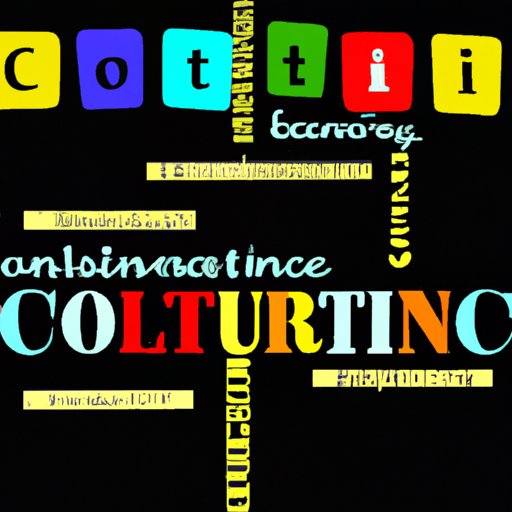Introduction
Cultural identity is a person’s sense of belonging to a particular culture. It’s shaped by a variety of factors, including language, traditions, beliefs, and experiences. Cultural identity is a key component of our lives, influencing not only how we interact with others but also how we perceive ourselves. In a globalized world, understanding cultural identity is essential for effective intercultural communication and personal growth.
Exploring Cultural Identity in a Globalized World
In today’s increasingly interconnected world, cultural identity is becoming more complex. As people move around the globe, their cultural identities become intertwined with other cultures. This has a profound impact on how we communicate with one another and how we view ourselves.
It’s important to understand the role of language, traditions, and beliefs in shaping our cultural identities. Language is often used to express cultural identity and can be seen as a reflection of a culture’s values and beliefs. Similarly, traditions and beliefs play a major role in how we identify with a particular culture. Migration also plays an important role in how cultural identities evolve, as people bring their own unique cultural perspectives with them when they move to new places.
Defining Cultural Identity Through Language, Traditions, and Beliefs
When exploring cultural identity, it’s important to look at what makes up a culture. According to anthropologist Clifford Geertz, “a culture is an historically transmitted pattern of meanings embodied in symbols, a system of inherited conceptions expressed in symbolic forms by means of which men communicate, perpetuate, and develop their knowledge about and attitudes toward life.” In other words, a culture is a collective set of beliefs and values that are shared among a group of people.
Language is one of the most powerful tools for expressing cultural identity. Different languages can have different connotations, which in turn can shape how people view themselves and others. For example, in some cultures, there are specific terms and phrases that are used to refer to members of certain groups or communities. These terms can convey a sense of respect, admiration, or even exclusion, depending on the context.
Traditions and beliefs are also crucial components of cultural identity. These can range from religious ceremonies and rituals to social customs and values. They provide a sense of connection and continuity between generations, helping to define a culture and give it a unique identity.

Understanding the Role of Cultural Identity in Intercultural Communication
Cultural identity plays an important role in intercultural communication. It influences how we interpret messages from other cultures and how we respond to them. When communicating with someone from a different culture, it’s important to take into account their cultural identity in order to ensure effective communication.
Cultural identity can also help bridge gaps between cultures by providing a common ground for understanding. By recognizing and appreciating each other’s cultural differences, we can create an environment of mutual respect and understanding. This can lead to more effective communication and collaboration between different cultures.
Investigating How Cultural Identity Impacts Self-Awareness and Personal Development
Cultural identity also has a significant impact on our sense of self. According to psychologist William Cross Jr., “cultural identity is the central factor in the psychological development of the individual and the core concept of cultural identity theory.” In other words, our cultural identity affects our self-perception and how we view ourselves in relation to others.
Our cultural identity can also influence our personal growth and development. By understanding our cultural identity, we can gain a better understanding of our strengths and weaknesses, as well as how our culture shapes our beliefs and values. This can help us to make informed choices and decisions that are in line with our cultural identity.
Conclusion
Cultural identity is an important part of our lives, influencing how we interact with others and how we view ourselves. It’s shaped by a variety of factors, including language, traditions, and beliefs. Understanding our cultural identity is essential for effective intercultural communication and personal growth. It can help us to bridge gaps between cultures and foster greater understanding and appreciation for diversity.
In conclusion, cultural identity is a complex and evolving concept. It’s essential for us to recognize and appreciate the role it plays in our lives and the lives of those around us. By doing so, we can create an environment of mutual understanding and respect, which can ultimately lead to greater harmony and peace in our world.
(Note: Is this article not meeting your expectations? Do you have knowledge or insights to share? Unlock new opportunities and expand your reach by joining our authors team. Click Registration to join us and share your expertise with our readers.)
